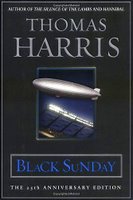 During the two national election cycles following the September 11, 2001, terrorist attacks, the U.S. Republican Party’s strategy was simple: scare Americans with suggestions of increased terrorism from abroad--and convince them that only the party of George W. Bush and Tom DeLay could possibly protect them in the future. That plan isn’t working quite so well anymore, as Bush’s approval ratings decline, the Iraq war turns even deadlier for U.S. soldiers, and GOP scandals--not limited to the corruption probe that brought down DeLay, or even the cover-up of Florida Congressman Mark Foley’s sexual advances toward male pages--have dominated the headlines and increased the odds of a Capitol Hill power shift. Yet in the run-up to the November 7 midterm elections, terrorism remains a fertile topic, at least in crime-fiction circles.
During the two national election cycles following the September 11, 2001, terrorist attacks, the U.S. Republican Party’s strategy was simple: scare Americans with suggestions of increased terrorism from abroad--and convince them that only the party of George W. Bush and Tom DeLay could possibly protect them in the future. That plan isn’t working quite so well anymore, as Bush’s approval ratings decline, the Iraq war turns even deadlier for U.S. soldiers, and GOP scandals--not limited to the corruption probe that brought down DeLay, or even the cover-up of Florida Congressman Mark Foley’s sexual advances toward male pages--have dominated the headlines and increased the odds of a Capitol Hill power shift. Yet in the run-up to the November 7 midterm elections, terrorism remains a fertile topic, at least in crime-fiction circles.Gerald Seymour, the British journalist-author renowned for his international espionage thrillers (Harry’s Game, A Line in the Sand, Rat Run), today offers a list in The Wall Street Journal of five novels that “depict terrorism with riveting authority”:
1. Black Sunday, by Thomas Harris (1975)
2. Most Secret, by Nevil Shute (1945)
3. The Whore-Mother, by Shaun Herron (1973)
4. The Little Drummer Girl, by John le Carré (1983)
5. The Day of the Jackal, by Frederick Forsyth (1971)
You’ll find Seymour’s comments about each of his picks here.
(Hat tip to Campaign for the American Reader.)

















No comments:
Post a Comment